
By Susan St John*
When the government announced in its May budget that it would tighten eligibility for young New Zealanders getting Jobseeker benefits, there were few details about how the policy would work. We now have those details, and they raise many questions.
From November next year, if parents’ combined earnings are more than NZ$65,529, their unemployed 18- or 19-year-old teenagers will become ineligible for Jobseeker benefits. According to Social Development Minister Louise Upston:
We want to be clear with young people, 18- and 19-year-olds and their parents, our expectation is that they are in further education, training or a job, and welfare should be a long way away from their first option.
Without a regulatory impact statement from the Ministry of Social Development, it is unclear what the government expects to save from this. And we don’t have any risk assessment of unintended consequences either.
However, we do have a previous regulatory impact statement (the only one released this year) that addressed changes to housing assistance entitlements for people with income from having boarders in their homes.
Tellingly, that impact statement said:
Risks associated with the changes include a disproportionate impact on marginalised communities and impacts on social housing tenants […] a number of cohorts are likely to be disproportionately impacted, including Māori, Pacific peoples, older people, disabled people and young people.
The expected savings from the rule change were also questioned, but the impact statement did not influence the announced policy, nor was there any select committee scrutiny.
Risking a disincentive to work
What we can say about the new Jobseeker proposal is that the income limit for both one-parent and two-parent families is not only low, but totally unrealistic.
A single teenager living at home, whose parents earn $1 under the NZ$65,529 threshold may get Jobseeker support of $268.13 a week (after tax) – but zero support if their income is even $1 above the threshold.
An income of $65,529 for two parents is already insufficient for their needs. What are they to do?
Any help from Working for Families will cease for their unemployed teenager from age 18. That means the family loses support to keep them adequately fed, clothed and able to find work or training.
If they are not on a Jobseeker benefit, they also won’t have any of the oversight or mentoring Work and Income is obliged to provide as part of the benefit.
In a potential scenario, imagine a low-income, single mother who is renting with two teenagers, one of whom is 18 and without work. With her children now older, she has retrained and is finally able to work full-time.
Let’s say she currently earns $75,000. For the last $20,000 of that, she loses $6,320 to tax and accident compensation levies, receives $5,400 less in Working for Families entitlements, her student loan repayment is $2,400, and she misses out on accommodation assistance of around $5,000.
All up, for her extra gross earnings of $20,000, she is less than $1,000 (in the hand) better off. She will now be further affected if and when this new policy is introduced.
Because of her gross income, her unemployed 18-year-old will not qualify for up to $14,000 of Jobseeker support each year.
The logical thing for a sole mother to do in this situation is to stop earning that extra $20,000. That would allow the 18-year-old to qualify for Jobseeker support, contributing to the household income by paying board.
The parental income test raises numerous other difficulties, too. For example, how are separated parents to be treated? What if a parent refuses to support the young person, or reveal their income details?
Where is the work?
Politically, the policy is confusing. It will come into force right on, or just after, the next election. At this stage, the Labour Party has criticised the proposal, but has not committed to overturning it.
More immediately, the policy risks achieving results contrary to the government’s stated intent – as Upston put it, “to encourage young people into work”.
As well as discouraging low-income households who may consider working less so their children qualify for Jobseeker support, the policy assumes there are the jobs to absorb these young people in the first place.
As of June this year, just over 15,000 18- and 19-year-olds were on Jobseeker support. Of those, about 4,300 are estimated to become ineligible.
At the same time, there is huge competition in a tight labour market. The overall unemployment rate of 5.2% disguises a much higher youth rate: 12.2% of young people are not in employment, education or training. Then there is additional underemployment of those who do have some work but want more.
In this difficult recession, the last thing we should do is to treat our young adults like dependent children. They need to be invested in, encouraged and mentored to find a pathway to meaningful work.![]()
Susan St John, Honorary Associate Professor, Economic Policy Centre, Auckland Business School, University of Auckland, Waipapa Taumata Rau.
This article is republished from The Conversation under a Creative Commons license. Read the original article.
16 Comments
Wrong - it doesn't "turn young adults into dependent children" - it makes "dependent adults" the responsibility of their parents who raised said "dependent adults".
The shortage of work is BS. The subway franchise in Whangarei has been screaming for sandwich makers forever...the same for Macas, BK etc.
Overlooking the little factoid that many earning at this level are hard working strugglers - but setting a good example to their kids of the need to actually work.
Meanwhile, the kids of those who have not attained such a mediocre income learn that a lack of effort = sit and enjoy the public tit.
Never mind the practical matter of the income testing required on self employed, companies and trusts - which exceeds the skill level of most winz staff.
Dumb short sighted policy.
Cutting benefits is not the answer. These should be consistently available to people who need them. As with all means tested solutions this is going to seriously hurt some people for almost no discernable benefit to the country.
This is pure and simple petty cruelty for the sake of it. I really think the government of NZ has more serious problems it should be working on. This policy is pathetic-ness on steroids. Demonstrating a total lack of competent leadership that any elected government should possess.
This is a low point for the government. The economy is continuing to stagnate, unemployment is rising and migration outflows are at record levels ... so you would think the government leadership team would be getting serious and digging deep on helping the nations economy.
But no, instead the government is spending its time and resources on putting together ZB culture-war talking points as considered policy and doing everything they can to avoid mentioning "economic growth" ever again. It feels like the country is being run by over-zealous secondary school prefects.
This is disgusting and incompetent on every level - morally, socially but especially economically. What an empty vessel we have leading our country right now.
Exactly, it seems to be the state of politics at the moment, instead of doing their jobs instead they decide to divide people up and persecute them for existing.
And some joke and laugh at the idea of universal benefit, " how would it even work, how would we pay for it". Then we get this sort of policy with it's effective 100% marginal tax rate etc. You would think that the powers that be would have the ability to think it through and come up with an actual incentive to week that would be so much better. Didn't these guys and girls run big business in a previous job?
Couldn't agree more. How the hell dd they think this achieves anything - a gift for the opposition. Someone needs a kick up the rear for this shambles....
It's time to get tough on the largest beneficiaries in NZ - boomers. Raise the superannuation age, look at means testing etc... watch how much money would be saved.
Said it before. Where does the army of accountants/lawyers come from to chase the mass avoidance practices used to shield those that can support themselves?
It would just hit uncomplex NZ born ma and pa wage earners.
In the end and on balance the simplicity of administration makes universal benefits a better approach. The cost of administering means testing and the damage it does to people on the boundaries of the means test makes it a bad delivery option.
If we broadened our tax base and had a growing economy and improving productivity - pensions and benefits would not be a big problem.
I think I saw an estimate that means testing Super could easily shave $1 billion a year off the bill, and growing. Hard to imagine the administration of the means testing could cost more than a small fraction of that.
Are there any other benefits that are handed out regardless of need, just to save on the cost of assessing need?
UBI much better option.
For those advocating means testing of Super. I'd like an example. Lets say you get $22k Super before tax. You own your own house. You've been fairly diligent throughout your life and have saved say $100k which will return about 4% before tax on TDs say $4k interest per year in today's environment. Your total income is thus about $26k before tax. What do you propose for your Super? What about if you don't own your own house but still have a mortgage? How much past a base Super must the govt decide your income is too much?
Means testing is bandied about too much as if it's the panacea in reducing the States burden. How about those advocating means testing coming up with some numerous common examples.
I think you're looking at a level that's much harsher than most are proposing. For example, one option that is often mentioned is stopping super payments to people who have other earnings over $100k, which would save something like a billion dollars a year (presumably there'd be some kind of taper involved rather than a harsh cutoff). That seems like a reasonable ballpark to me - we shouldn't be paying benefits to people earning well above the average wage. Or you could start to taper off payments at an income level that matches the average wage, increasing each year in line with wages. Presumably that would save a few billion.
Personally I philosophically like the idea of asset testing as well. It seems insulting to me that a young wage earner is paying tax to fund the living expenses of a property millionaire who is quite capable of living off their capital. We've essentially got the average worker fronting up tax to preserve the inheritance of some other lucky bugger which goes against my idea of fairness. Practically, I do admit that this is tricky to administer and people would do their best to avoid being caught out.
Thanks. $100k is pretty high. If there have been studies on this I'd certainly be interested to see them.
It's really not that hard to find, over 50k people earning over $100k and still getting pension: https://www.stuff.co.nz/money/350177826/50000-people-earn-over-100k-get…
50,000 x ~25,000 = $1.25b
And I would suggest redistributing a third of that to those in the most hardship on the pension, so save ~800m, redistribute ~450m to the bottom, particularly those renting (or subsidies for retirement home builds etc).

We welcome your comments below. If you are not already registered, please register to comment
Remember we welcome robust, respectful and insightful debate. We don't welcome abusive or defamatory comments and will de-register those repeatedly making such comments. Our current comment policy is here.